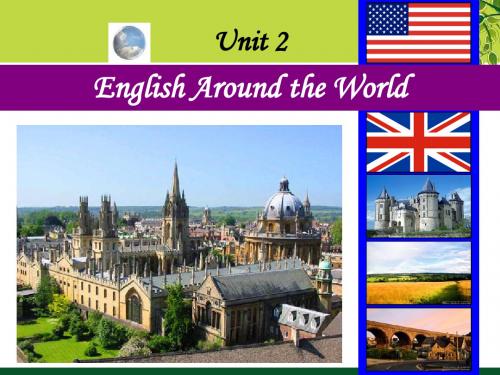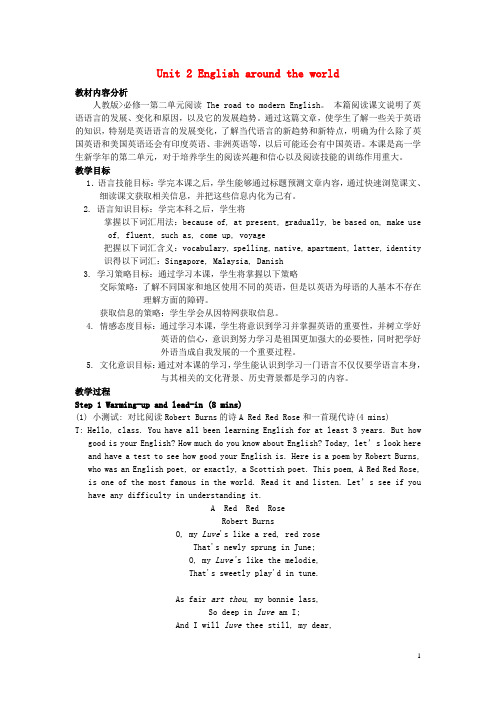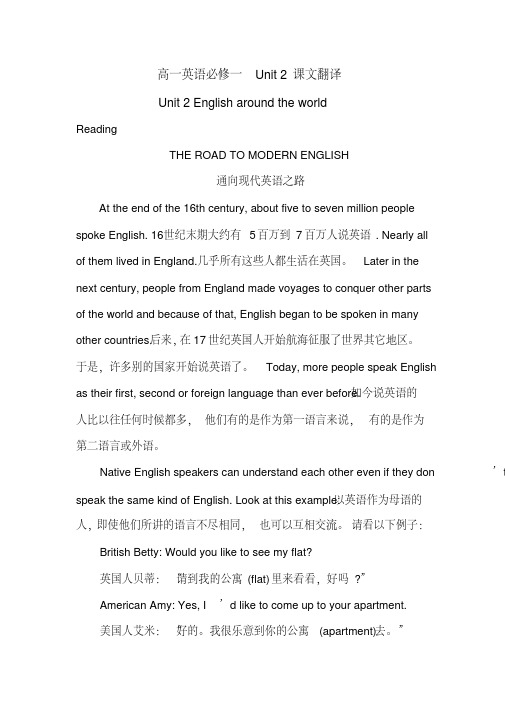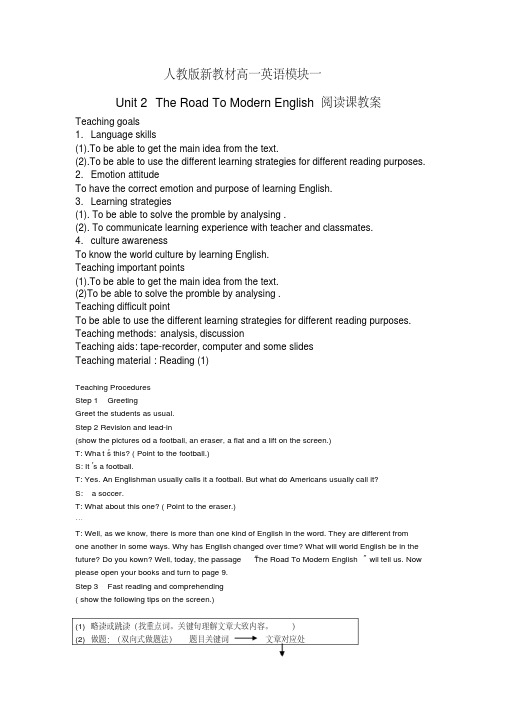必修一 unit2 reading The Road to Modern English 区级公开课)
- 格式:ppt
- 大小:2.52 MB
- 文档页数:27

The Road to Modern English(At the end of the 16th century, about five to seven million people spoke English.16世纪末期大约有5百万到7百万人说英语。
Nearly all of them lived in England.几乎所有这些人都生活在英格兰。
Later in the next century, people from England made voyages to conquer other parts of the world and because of that, English began to be spoken in many other countries.后来,在17世纪英国人开始航海征服了世界其它地区,于是,许多别的国家开始说英语了。
Today, more people speak English as their first, second or a foreign language than ever before.)如今说英语的人比以往任何时候都多,他们有的是作为第一语言来说,有的是作为第二语言或外语。
(Native English speakers can understand each other even if they don’t speak the same kind of English.)以英语作为母语的人,即使他们所讲的语言不尽相同,也可以互相交流。
Look at this example:British Betty: Would you like to see my flat?American Amy: Yes. I’d like to come up to your apartment.请看以下例子:英国人贝蒂:“请到我的公寓(flat)里来看看,好吗?美国人艾米:“好的。


Unit 2 English around the world教材内容分析人教版>必修一第二单元阅读The road to modern English。
本篇阅读课文说明了英语语言的发展、变化和原因,以及它的发展趋势。
通过这篇文章,使学生了解一些关于英语的知识,特别是英语语言的发展变化,了解当代语言的新趋势和新特点,明确为什么除了英国英语和美国英语还会有印度英语、非洲英语等,以后可能还会有中国英语。
本课是高一学生新学年的第二单元,对于培养学生的阅读兴趣和信心以及阅读技能的训练作用重大。
教学目标1.语言技能目标:学完本课之后,学生能够通过标题预测文章内容,通过快速浏览课文、细读课文获取相关信息,并把这些信息内化为己有。
2. 语言知识目标:学完本科之后,学生将掌握以下词汇用法:because of, at present, gradually, be based on, make use of, fluent, such as, come up, voyage把握以下词汇含义:vocabulary, spelling, native, apartment, latter, identity 识得以下词汇:Singapore, Malaysia, Danish3. 学习策略目标:通过学习本课,学生将掌握以下策略交际策略:了解不同国家和地区使用不同的英语,但是以英语为母语的人基本不存在理解方面的障碍。
获取信息的策略:学生学会从因特网获取信息。
4. 情感态度目标:通过学习本课,学生将意识到学习并掌握英语的重要性,并树立学好英语的信心,意识到努力学习是祖国更加强大的必要性,同时把学好外语当成自我发展的一个重要过程。
5. 文化意识目标:通过对本课的学习,学生能认识到学习一门语言不仅仅要学语言本身,与其相关的文化背景、历史背景都是学习的内容。
教学过程Step 1 Warming-up and lead-in (8 mins)(1) 小测试: 对比阅读Robert Burns的诗A Red Red Rose和一首现代诗(4 mins)T: Hello, class. You have all been learning English for at least 3 years. But how good is your English? How much do you know about English? Today, let’s look here and have a test to see how good your English is. Here is a poem by Robert Burns, who was an English poet, or exactly, a Scottish poet. This poem, A Red Red Rose, is one of the most famous in the world. Read it and listen. Let’s see if you have any difficulty in understanding it.A Red Red RoseRobert BurnsO, my Luve's like a red, red roseThat's newly sprung in June;O, my Luve's like the melodie,That's sweetly play'd in tune.As fair art thou, my bonnie lass,So deep in luve am I;And I will luve thee still, my dear,Till a' the seas gang dry.Till a' the seas gang dry, my dear,And the rocks melt wi' the sun;I will luve thee still, my dear,While the sands o' life shall run.And fare thee well, my only Luve!And fare thee well, a while!And I will come again, my Luve,Tho' it were ten thousand mile!T: Did you find it easy or difficult? What about this one? This poem was written by a modern writer.I Am Not YoursI am not yours, not lost in you,Not lost, although I long to beLost as a candle lit at noon,Lost as a snowflake in the sea.You love me, and I find you stillA spirit beautiful and bright,Yet I am I, who long to beLost as a light is lost in light.Oh plunge me deep in love—put outMy senses, leave me deaf and blind,Swept by the tempest of your love,A taper in a rushing wind.T: Why is the first poem difficult to understand while the second one not? (Mainly because of some of the words used in the first poem, which are not often used now. Robert Burns lived in the 18th century while the writer of the second poem is a modern poet.) So we can see people in the past used different words from what is used today.(2) 听一段一位学生和来自澳大利亚的外教的对话(4 mins)T: Now, when one day Qiu Zhensong met our foreign teacher Zak, who is from Australia, what happened? Let’s welcome Zak and Qiu Zhensong.(After the dialogue, the foreign teacher explained.) Did you understand our dialogue? (Ss: No.) What’s the difficulty? (Different words were used in Australia which you do not know in American or British English.) T: So from the two poems and the dialogue we can see people from different countries speak different English and people in different times also use different English. How did the difference come about?[意图说明] 引入话题:不同时代、不同国家所使用的英语有所不同。

高一英语必修一Unit 2课文翻译Unit 2 English around the worldReadingTHE ROAD TO MODERN ENGLISH通向现代英语之路At the end of the 16th century, about five to seven million peoplespoke English. 16世纪末期大约有5百万到7百万人说英语. Nearly allof them lived in England.几乎所有这些人都生活在英国。
Later in thenext century, people from England made voyages to conquer other partsof the world and because of that, English began to be spoken in manyother countries.后来,在17世纪英国人开始航海征服了世界其它地区。
于是,许多别的国家开始说英语了。
Today, more people speak Englishas their first, second or foreign language than ever before.如今说英语的人比以往任何时候都多,他们有的是作为第一语言来说,有的是作为第二语言或外语。
Native English speakers can understand each other even if they don’t speak the same kind of English. Look at this example:以英语作为母语的人,即使他们所讲的语言不尽相同,也可以互相交流。
请看以下例子:British Betty: Would you like to see my flat?英国人贝蒂:“请到我的公寓(flat)里来看看,好吗?”American Amy: Yes, I’d like to come up to your apartment.美国人艾米:“好的。

人教版新教材高一英语模块一Unit 2 The Road To Modern English阅读课教案Teaching goalsnguage skills(1).To be able to get the main idea from the text.(2).To be able to use the different learning strategies for different reading purposes.2.Emotion attitudeTo have the correct emotion and purpose of learning English.3.Learning strategies(1). To be able to solve the promble by analysing .(2). To communicate learning experience with teacher and classmates.4.culture awarenessTo know the world culture by learning English.Teaching important points(1).To be able to get the main idea from the text.(2)To be able to solve the promble by analysing .Teaching difficult pointTo be able to use the different learning strategies for different reading purposes. Teaching methods: analysis, discussionTeaching aids: tape-recorder, computer and some slidesTeaching material: Reading (1)Teaching ProceduresStep 1 GreetingGreet the students as usual.Step 2 Revision and lead-in(show the pictures od a football, an eraser, a flat and a lift on the screen.)T: Wha t’s this? ( Point to the football.)S: It’s a football.T: Yes. An Englishman usually calls it a football. But what do Americans usually call it?S: a soccer.T: What about this one? ( Point to the eraser.)…T: Well, as we know, there is more than one kind of English in the word. They are different fromone another in some ways. Why has English changed over time? What will world English be in the future? Do you kown? Well, today, the passage “The Road To Modern English” wil tell us. Now please open your books and turn to page 9.Step 3 Fast reading and comprehending( show the following tips on the screen.)(1)略读或跳读(找重点词。

人教版英语必修一unit2reading1、UnitTwo:ReadingTheRoadToModernEnglish?Howmanydialects方言arethereinChina?dialectsfamilyinChinaChinese北方方言吴语赣语闽南语湘语客家话粤语Warmingup–II(2m)DoyouthinktherearesomedialectsinEnglish?BritainTheU.S.AEnglishd ialectsinCanadadifferentAustraliacountriesIndiaNewZeal and……..BrEAm. EWhenyouheartwonativespeakersofEnglish,theymaysti2、llnotspeakthesamekindofEnglish.ThedifferencesbetweenBritishEnglishand AmericanEnglish.BrEAmEChineseBrEAmE电梯liftelevatorpetrolgas,gasoline 汽油公寓flatapartment秋天autumnfall地铁undergroundsubway大学universitycollege垃圾rubbishgarbage垃圾箱dustbintrashcan假期holidayvacation两周fortnighttwoweeksMatchthewordsthathavethesamemeaning.pet3、roleraserflatgascolorapartmentliftelevatorrubberhonourhonorcolourpict uresmoviesundergroundsubwaySkimming1.Englishhas/hadthemostspeakers___ .A.nowB.whentheBritishruledmanypartsoftheworldC.inthetimeofShakespear eD.inthe12thcentury2.Whichofthefollowingstatementistrue?nguagesal nguageschangeonly4、nguageschangewhencultureschange 3.FromAD450to1150,Englishsoundedmorelike_____?A.FrenchB.ChineseC.Germ anD.Russian4.Shakespeare’sEnglishwasspokenaround______?A.1400’sB.11 50’sC.450’sD.1600’s5.WhichcountryhasthefastestgrowingnumberofEngli shspeakersintheworld?A.AustraliaB.ChinaC.5、IndiaD.BritainPara1BriefintroductionofthechangeinEnglish.简介英语改变TimeWho(howmanypeople)spokeEnglishTheendofthe16thAbout5-7millionpeopl e,mostlycenturyLivinginFnglandLaterinthenextcenturyConquerotherparts, spokeninmanyothercountriesTodayMorepeoplespeakEnglishthanbeforePara2I fanAmericanistalkingtoanEnglishman,___A___6、_.A.TheywillhavealmostnodifficultyinunderstandingB.Theywillhavealotof misunderstandingsbetweeneachotherC.TheAmericanfindsitdifficulttounder standtheEnglishmanD.TheEnglishmanfindsitdifficulttofollowtheAmericanR eadPara3andanswerthequestion:WhydoesEnglishchangeovertime?Becauseofcu lturalcommunication.ThehistoryoftheE7、nglishlanguageTheroadtomodernEnglishAD450-Englishwasbasedmoreon_G__e_ r_m_a_n.1150AD800-Englishbecame__l_e_s_slikeGerman1150Becausethosewho _r_u_l_e_dEnglandspokefirstDanishandlaterFrench.Inthe_S_h_a_k__e_s_p_ e_a_r_e_madeuseofawider1600svocabularythaneverbefore.TheroadtomodernE nglishIn1620SomeBritishsettlersmoved8、to_A_m__e_r_ic_a__.LaterinSomeBritishpeopleweretakentothe18th_A_u__st _r_a_l_ia__.centuryBytheTheEnglishlanguagewassettled.19thTwobigchange sin_E_n_g_l_is_h__s_p_e_ll_in_g__centuryhappened:SamuelJohnsonwrotehi s_d_ic_t_io_n_a_r_y__andNoahWebsterwrote_T_h_e__A_m_e_r_i_c_a_n_D__ic _t_io_n_a_r_y_o_f_______th__e_E_n_g_9、l_i_sh__L_a_n_g_u_a_g_e_._TwoimportantpersonsinPara4SamuelJohnsonBorn :September18,1709WriteadictionaryOneoftheEnglishlanguage’smostprofou ndinfluences.(最深的影响)NoahWebsterBorn:October16,1758Died:May28,1843WhenNoahwas43,hestart edwritingthefirstAmericandictionary.HedidthisbecauseAmericansindiffer entpartsofthecountry10、spelled,pronouncedandusedwordsdifferently.Para5WhyisIndiamentionedint helastparagraph?AA.BecauseIndiaisatypical(独特的)countrywhospeaksEnglishasasecondlanguagebecauseofitslongbeingruled byBritain.B.BecauseIndiahasaverylargenumberofEnglishspeakers.C.Becaus eIndiaisacountrywhereEnglishplaysaveryimportantroleinsociallif11、e.D.BecauseIndiahasalonghistoryofcommunicationwithBritain.Retellthete xt.Atfirst,onlypeoplein_E_n__g_la_n_d_ter,peoplefromEn gland__m_o_v_e_d_tootherparts,soEnglishbegantobespokenin_m__a_n_y__o_ th_e_r__c_o_u_n_t_r_ie_s_.Today,___m__o_r_epeoplespeakEnglishastheir_ _fi_r_s_t,secondorforeignlanguage.__12、N_a_t_iv_e_Englishspeakers__c_a_n_understandeachotherbut__n_o_t__e_v_ e_r_y_th_i_n_g_.Alllanguageschangewhen__c_u_l_tu_r_e_scommunicatewith oneanother.SothereareBritishEnglish,AmericanEnglish,AustralianEnglish andsoon.Theyallhavetheirown__i_d_e_n_ti_t_y.Englishisalsospokenasafor eignorsecondlanguagein_m__a_n_y_o_t_13、h_er_c_o_u_n_tr_ie_s.MaybeonedayChineseEnglishwillbecomeoneoftheworld English.DiscussionYoucanchooseoneofthequestionstotalkaboutinGroups(Pa ge10):1,WhydoyouthinkpeopleallovertheworldwanttolearnEnglish?2,Whydoy outhinkmorepeopleintheworldwanttolearnChinese?TouseforTouseinschoolbu sinessWhydosomanyTotalkpeoplewanttoT14、oreadtonativelearnEnglish?EnglishspeakersbooksTowritetopenTolistentof riendsEnglishmusicandmovies “曾经有一份真诚的爱情摆在我的面前,但是我没有珍惜,等到了失去的时候才懊悔莫及,尘世间最苦痛的事莫过于此。
人教版新教材高一英语模块一Unit 2 The Road To Modern English阅读课教案Teaching goalsnguage skills(1).To be able to get the main idea from the text.(2).To be able to use the different learning strategies for different reading purposes. 2.Emotion attitudeTo have the correct emotion and purpose of learning English.3.Learning strategies(1). To be able to solve the promble by analysing .(2). To communicate learning experience with teacher and classmates.4.culture awarenessTo know the world culture by learning English.Teaching important points(1).To be able to get the main idea from the text.(2)To be able to solve the promble by analysing .Teaching difficult pointTo be able to use the different learning strategies for different reading purposes. Teaching methods: analysis, discussionTeaching aids: tape-recorder, computer and some slidesTeaching material: Reading (1)Teaching ProceduresStep 1 GreetingGreet the students as usual.Step 2 Revision and lead-in(show the pictures od a football, an eraser, a flat and a lift on the screen.)T: Wha t’s this? ( Point to the football.)S: It’s a football.T: Yes. An Englishman usually calls it a football. But what do Americans usually call it?S: a soccer.T: What about this one? ( Point to the eraser.)…T: Well, as we know, there is more than one kind of English in the word. They are different from one another in some ways. Why has English changed over time? What will world English be in the future? Do you kown? Well, today, the passage “The Road To Modern English” wil tell us. Now please open your books and turn to page 9.Step 3 Fast reading and comprehending( show the following tips on the screen.)T: Now before we read the pasage and do the exercises in COMPRHENDING, let’s learn some tips. Please look at the screen. For the first time you must scan the text quickly for three minutes. Be sure not to read the text sentence by sentence .Read the key words and key sentences to gain a brief idea about the topic of the text. Then read the questions and find the key words. Go back to the text and find the words or their synonyms. You can find the answers aroud the key words. ( After a while.)T: Have you finished yet? (S: yes.) OK. Now let’s check the answers. Who will give the first answer?S1: A. “ English has the most speakers now.”T: where in the text did you find the key words or its synonyms?S1: In the first paragraph the last sentence. “China may have the largest number of English Speakers.” The sentence ahead shows us that the time is today or now.T: Very good. And what about the next question?( It doesn’t matter whether the students make mistakes. The most important of all is to lead them to find the key words or sentences and get the right answers.)Step 4 Analysis of the structure of the textT: Now read the passage again. Try to find the topic sentnces in five minutes. (After a while.) Paragraph 1T: Can you find a topic sentence in Paragraph 1.Ss: No.T: Can you find the words indicating the times? Read them out.Ss: “ At the end of , in the next century, today.”T: Very good. We can see that as the time went by, the number of people speaking English increased. Now use one sentence to sum up the paragraph. Who would like to try? Well, Lin Hong, Have a try.S2: More and more people start to speak English.T: Right. ( Write the sentence down.) Let’s go on to the next paragraph.Paragraph 2T: which is the key sentence?S3: The first sentence. “Native English speakers can understand each other even if they don’t speak the same kind of English.”T: Can you see the example in the paragraph?Ss: Yes.T: Is it used to support the first sentence?Ss: No.T: Actually it is used to support the sentence--- However, they may not be able to understand everything. Generally speaking, the sentence beginning with such words--- however, but ---after a statement is what the writer intends to give emphasis on. Thus ,it is often the key sentences. So why can’t they understand each other?Ss: World English are different from each other in some ways.T: Exactly. That’s what the writer intends to illustrate. ( Write it down on the blackboard.) What about the third paragraph?( conclusion) From the four topic sentences we can see they mainly focus on one thing. What’s it? Ss: English.T: Yes, they are about four aspects of the history of English. So we can say that it’s a brief history of English. ( Write it down.)T: why did the writer decide to end the passage with a question? According to the passage, languages change when culturescommunicate with one another. So the writer intended to predict a possible road to modern English, that is, when Chinese culture communicate with Eglish culture, English may chang, too. So as time goes by, Chinese English may become one of the world English. That is what the writer intended to tell us about in this passage. So the writer gave it the title--- The Road To Modern English. When we want to write something, we should follow thetoo.Step 5: DiscussionT: Now let’s discuss the questions in Comprehending Section 2.( Let the students discuss in pairs. Then share their opinions in class.The answers may vary. But it doesn’t matter what their answers may be. Most important of all, encourage them to express what they really think.)Step 6 summing up and homeworkT: Today, we have learned a text about the brief history of English. We have also learn some usefulT: Rview them and practice more after class. And finfish the exercise in the part of Learning About Languange. That’s all for today.。
The road to modern EnglishAt the end of 16th century , about five to seven million people spoke English. Nearly all of them lived in England. Later in the next century, people from England made voyages to conquer other parts of the world and because of that, English began to be spoken in many other countries . Today, more people speak English as their first , second or a foreign language than ever before.Native English speakers can understand each other even if they don’t speak the same kind of English. Look at this example :British Betty : Would you like to see my flat?American Amy : Yes, I’d like to come up to your apartment.So why has English changed over time? Actually all languages change and develop when cultures meet and communicate with each other. At first, the English spoken in England between about AD450 and 1150 was very different from the English spoken today. It was based more on German than the English we speak at present. Then gradually between about AD800 and 1150, English became less like German because those who ruled England spoke first Danish and later French. These new settlers enriched the English language and especially its vocabulary. So by the 1600’s Shakespeare was able to make use of a wider vocabulary than ever before. In 1620, some British s settlers moved to America. Later in the 18th century some British people were taken to Australia too. English began to be spoken in both countries.Finally by the 19the century, the language was settled. At that time two big changes in English spelling happened: first Samuel Johnson wrote his dictionary and later Noah Webster wrote The American Dictionary of the English Language. The latter gave a separate identity to American English spelling.English now is also spoken as a foreign or second language in South Asia. For example, India has a very large number of fluent English speakers because Britain ruled India from 1765 to 1947. During that time English became the language for government and education. English is also spoken in Singapore and Malaysia and countries in Africa, such as South Africa. Today the number of people learning English in China is increasingly rapidly. In fact, China may have the largest number of English learners. Will Chinese English develop its own identity? Only time will tell.。